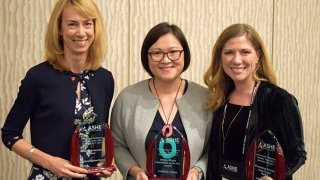The largest professional group for those who study higher education gave three of its top awards to USC Rossier scholars this month.
The Association for the Study of Higher Education, or ASHE, honored two professors and one postdoctoral scholar from USC Rossier at the organization’s annual conference, held in Houston.
The awards recognized scholarship around equity and leadership, which matched well with the conference’s theme, “Power to the People.”
Professor of Higher Education Adrianna Kezar received the Research Achievement Award, given for scholars whose “published work advances understanding of higher education in a significant way.”
“There’s been one guiding idea that I think is a thread throughout my work, and it is that we can be the best principled advocates for others—particularly when we come from a place of privilege—when we’re striving for wisdom,” Kezar said. “And in these political times, boy do we need wisdom. Research and data alone are insufficient, and are not going to provide us the policy and practices we hope for in education.”
Kezar is co-director of USC Rossier’s Pullias Center for Higher Education.
Julie Posselt, an assistant professor of higher education, received the Early Career Award. Posselt, who authored Inside Graduate Admissions: Merit, Diversity and Faculty Gatekeeping, earned her award for early career impact.
“Looking back at the list of people who have received this in the past, I know that ASHE is being really thoughtful about valuing diverse kinds of scholarship and diverse kinds of people,” Posselt said. “I’m really proud to be a member of an association that’s acting consciously to try to redistribute power to the people.”
And Cheryl D. Ching, a postdoctoral scholar at USC Rossier’s Center for Urban Education, received the Bobby Wright Dissertation of the Year Award, named after Irvin Lee “Bobby” Wright, a former director of the Centre for Native American Studies at Montana State University who passed away in 1991 at age 40 as a result of AIDS.
“This award is not just about the quality of scholarship, but also about the hottest ideas in equity and diversity, and for this I’m even more grateful to the awards committee for recognizing something in my study that speaks to [Wright’s] legacy,” Ching said in accepting the award.
A showcase event

The awards capped a conference that showcased USC Rossier’s higher education program. More than 30 faculty members, postdoctoral scholars and students presented research, and several faculty members headlined presidential symposia that explored topics related to the conference theme.
Outgoing ASHE president Shaun R. Harper, director of the USC Race and Equity Center, delivered a presidential dress that opened to Kanye West’s song “Power” and didn’t mince words about power imbalances in colleges and universities.
“Ours remains a largely white, overwhelmingly white, profession—overall in universities and even in our very loving and inclusive and caring and social-justice-minded field of higher education, we’re still overwhelmingly white,” Harper said. “Given the composition of our faculties, it is white people who get to determine who gains access.”
Harper detailed several ways in which power is concentrated in higher education in ways that disenfranchise people of color, from the structure of universities to the content decisions of research journals. Harper criticized the field for often focusing on “pointless” studies that don’t help people.
“Consequential times, my colleagues, call for consequential questions,” he said.






